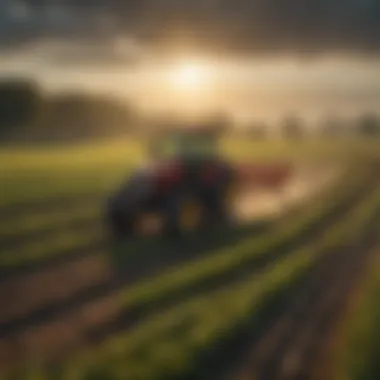Opportunities in Crop Insurance Careers Near You


Intro
In recent years, the significance of crop insurance has gained renewed attention. The agriculture industry faces a range of risks including unpredictable weather patterns, pests, and market fluctuations. Crop insurance serves as a safeguard for farmers, ensuring that they have financial backing to recover from losses. This in turn impacts not only individual farmers but also the broader agricultural economy and food security.
Jobs in crop insurance offer a variety of paths for professionals dedicated to supporting the agricultural sector. As this field evolves, it presents many opportunities for those seeking meaningful work that contributes to sustainability and economic stability.
Overview of the Topic
Definition and Importance
Crop insurance is designed to protect farmers against potential yield losses due to adverse conditions. It provides financial assurance, allowing farmers to invest in their operations with a degree of confidence. The importance of crop insurance cannot be overstated, as it plays a critical role in maintaining the viability of agricultural practices in a changing world. These policies not only act as a financial cushion but also encourage continuity in farming, thereby stabilizing food supply chains.
Current Trends
As the industry continues to develop, notable trends have emerged:
- Increased use of technology: The utilization of data analytics and precision agriculture is becoming more common, allowing for better risk assessment and management.
- Focus on sustainability: There is an ongoing demand for environmentally sustainable practices within crop insurance. Addressing climate change impacts is now a priority.
- Expansion of education and awareness: Producers are more informed about the benefits of crop insurance. This has led to higher participation rates and a more robust understanding of various insurance options available.
These trends shape the job landscape in crop insurance, creating diverse opportunities that require a range of skills and knowledge.
Key Techniques and Practices
Step-by-Step Guide
When pursuing a career in crop insurance, one can follow several steps to become effectively involved:
- Gain relevant education: A degree in agriculture, economics, or a related field provides foundational knowledge.
- Networking: Engage with industry professionals through seminars, workshops, and online platforms such as LinkedIn or Reddit. Building relationships is key in this sector.
- Understand the policies: Familiarize yourself with various crop insurance products and regulations set by organizations like the Federal Crop Insurance Corporation.
- Seek job openings: Use job boards, agricultural associations, and local resources to find positions in crop insurance.
- Continuous learning: Stay updated with industry changes through additional courses or certifications related to risk management and agricultural technology.
Tools and Equipment Needed
Working in crop insurance often involves using specific tools and resources:
- Data analysis software: Essential for assessing risk and managing policies.
- Insurance management applications: Helps streamline policy management and claims processing.
- Communication tools: Effective communication with clients is crucial for understanding their needs and conveying policy details.
Challenges and Solutions
Common Obstacles
Working in crop insurance is not without challenges:
- Complex regulations: Understanding the ever-changing regulatory landscape can be daunting.
- Market volatility: Fluctuating crop prices can influence the insurance market.
- Awareness gaps: Some farmers may lack knowledge about available coverage options, limiting their participation.
Innovative Solutions
Overcoming these obstacles requires creativity and strategic thinking:
- Professional development programs: Training courses that clarify regulatory complexities can significantly aid industry newcomers.
- Outreach initiatives: Increasing knowledge through community workshops can enhance farmer understanding of insurance benefits.
- Technology-driven solutions: Utilizing mobile apps to provide information about insurance products can bridge gaps in awareness.
"Crop insurance is essential for farmers to mitigate risks, providing stability and assurance in unpredictable times."
In summary, exploring crop insurance jobs involves understanding the critical role these positions play in the agricultural sector. With an emphasis on current trends, skills required, and strategies for overcoming challenges, this field offers promising opportunities for those interested in making a positive impact.
Understanding Crop Insurance
Understanding crop insurance is essential in the context of agriculture, particularly for those involved in farming or related industries. Crop insurance serves as a protective measure against potential losses caused by various factors such as weather events, pests, and diseases. This section outlines the fundamental concepts that underpin crop insurance and its significance in modern agriculture.
Defining Crop Insurance
Crop insurance is a type of insurance designed to protect farmers from the loss of crop yield due to specific risks that can occur during the growing season. There are generally two types of crop insurance: multiple peril crop insurance (MPCI) and crop-hail insurance. MPCI covers losses from natural disasters such as drought, floods, and other unforeseen events, while crop-hail insurance specifically addresses damages caused by hailstorms.


Farmers enroll in crop insurance programs to secure financial stability and minimize the risk of severe economic impacts due to crop failures. The premiums paid for this insurance vary based on factors such as the crop type, location, and coverage choice. Ultimately, the goal is to maintain the financial viability of farming operations even when facing unfavorable conditions.
Importance of Crop Insurance for Farmers
The significance of crop insurance cannot be overstated. Here are some key reasons highlighting its importance:
- Risk Management: Crop insurance acts as a safety net for farmers, allowing them to manage unexpected risks effectively. This ensures that they can recover financially when faced with significant losses.
- Access to Financing: Financial institutions often require farmers to have crop insurance before offering loans. This assurance mitigates the lender's risk, making it easier for farmers to access necessary funds to maintain or expand their operations.
- Promotes Sustainability: By providing a financial cushion against losses, crop insurance encourages farmers to pursue sustainable practices. It allows them to invest in quality seeds, efficient irrigation, and modern agricultural technologies without the fear of total investment loss in the event of unforeseen circumstances.
- Safeguarding Food Supply: The presence of crop insurance contributes to maintaining stability in food production. When farmers are protected financially, they are more likely to stay in business and grow the food supply, which is crucial for meeting the needs of the population.
Crop insurance is a critical tool that helps farmers navigate the uncertainties of agriculture, ensuring the overall stability of the agricultural economy.
Job Roles in Crop Insurance
The landscape of crop insurance is multifaceted. Different job roles exist within this vital sector. Each position plays an important part in the agricultural ecosystem. Understanding these roles helps individuals navigate potential career paths.
Each role within crop insurance has unique responsibilities. They contribute to both the efficiency and effectiveness of the industry. Identifying these roles can guide job seekers toward making informed decisions about their career choices.
Underwriter Positions
Underwriters in crop insurance assess the risks associated with insuring agricultural products. Their expertise is crucial in determining the types of coverage available to farmers. These professionals analyze data about crop yields, weather patterns, and market trends. Based on their analysis, they set the terms of the insurance policies. This role is critical because it directly affects the pricing and availability of insurance for farmers.
• Skills Required: Attention to detail, analytical reasoning, and strong mathematical skills. • Education: A background in finance, agriculture, or risk management is often beneficial.
Claims Adjuster Roles
Claims adjusters are central to the claims process in crop insurance. When farmers report losses due to covered events, adjusters investigate these claims. They assess damages to determine the compensation farmers receive. This role requires a deep understanding of both the agricultural sector and the specific policies in place. Claims adjusters must also communicate effectively with farmers to explain the claims process.
• Skills Required: Strong communication skills, investigative skills, and knowledge of agricultural practices. • Education: Degrees in agriculture, insurance, or business administration are advantageous.
Risk Assessment Analyst
Risk assessment analysts play a vital role in evaluating the potential risks faced by agricultural enterprises. They utilize advanced statistical methods and models to predict future losses. Their insights help underwriters design better insurance products tailored to actual risks. Understanding market dynamics is key for these analysts as well. They must stay updated on industry trends and environmental factors that could impact insurance claims.
• Skills Required: Proficiency in statistical analysis, critical thinking, and familiarity with risk management. • Education: A degree in statistics, finance, or a related field enhances qualifications.
Sales and Marketing Opportunities
Sales and marketing roles in crop insurance focus on promoting insurance products to farmers and agricultural businesses. These professionals are responsible for building relationships with clients. They must understand the needs of clients and effectively communicate how insurance solutions can meet those needs. A successful marketing strategy can significantly influence a firm's success in this competitive field.
• Skills Required: Excellent interpersonal skills, creativity, and a deep understanding of the agricultural market. • Education: Backgrounds in marketing, business, or agriculture are beneficial.
Key Takeaway: Each role in crop insurance serves a distinct purpose. Together, they underpin the support system that helps farmers mitigate risks in their operations. Understanding these roles provides valuable insights for anyone considering a career in crop insurance.
Required Skills and Qualifications
The realm of crop insurance demands a unique blend of skills and qualifications. Agricultural stability and sustainability hinge upon effective crop insurance practices. Understanding the skills needed allows job seekers to tailor their experiences to fit the diverse roles in this field. Hiring managers often emphasize the following key skills in candidates.
Educational Background
A solid educational background forms the foundation for various positions in crop insurance. Most employers prefer candidates with degrees in fields such as agriculture, finance, risk management, or economics. These courses impart essential knowledge about farming practices, economic principles, and risk assessment strategies. Some roles, like that of actuarial services or advanced risk assessment analysts, may require advanced degrees or certifications, such as a Master’s in Agricultural Economics.
Additional certifications, such as those offered by the Crop Insurance and Reinsurance Bureau, demonstrate commitment and expertise. This educational grounding not only enhances employability but also equips professionals to contribute meaningfully to the industry.
Analytical Skills Requirement
Analytical skills are critical in crop insurance roles, as these positions often involve risk analysis and assessment. Professionals must evaluate data, trends, and market conditions to predict potential losses and to make informed decisions. This involves familiarity with statistical analysis and software tools that can interpret agricultural data. Drew importance here is the ability to interpret varying climate patterns and their probable effects on crops.
"Analysts play a pivotal role in evaluating risks and forecasting demands in the ever-evolving agricultural landscape."
In addition to technical skills, being detail-oriented is crucial. A small error in data interpretation can result in significant financial consequences, affecting both insurers and farmers.


Communication and Customer Service Skills
Effective communication is essential in crop insurance jobs. Professionals often interact with farmers to explain policies, claims processes, and to provide guidance on risk management. Good communication ensures that stakeholders can make informed decisions based on their unique agricultural circumstances.
Customer service skills are equally important, as these roles often require building and maintaining relationships. Crop insurance professionals must empathize with farmers' challenges and offer tailored solutions to their concerns. Training in negotiation techniques and conflict resolution can enhance a professional's ability to manage client expectations and complaints.
A strong combination of technical and interpersonal skills prepares individuals for a successful future in the crop insurance sector.
Finding Crop Insurance Jobs
Finding job opportunities in the crop insurance sector is paramount for individuals looking to engage in a field that is integral to agricultural stability. Crop insurance not only supports farmers in protecting their livelihoods but also presents numerous career pathways for professionals. The core elements in finding these jobs include understanding where to look, how to network effectively, and connecting with organizations that can aid in professional development. Each of these factors plays a crucial role in enhancing one’s visibility and competitiveness in the job market.
Utilizing Online Job Portals
Online job portals serve as a fundamental resource for job seekers in the crop insurance industry. Websites like Indeed, Monster, and LinkedIn aggregate job listings from various companies, making it easier for applicants to access a broad range of positions. When searching for crop insurance jobs, it is key to use relevant keywords such as "crop insurance adjuster," "risk assessment analyst," or "underwriter" to filter through the available roles effectively.
While browsing these platforms, applicants should take note of the following:
- Create a detailed profile: A well-crafted resume and professional profile can attract potential employers.
- Set job alerts: Most job portals allow users to set alerts for specific searches, ensuring new opportunities are not overlooked.
- Research companies: Familiarize yourself with the top employers in the crop insurance sector, which can provide insight into their hiring practices and workplace culture.
Networking within the Industry
Networking plays an essential role in job searching, particularly in specialized fields like crop insurance. Engaging with professionals already working in the industry can open doors that online applications may not. Networking can be achieved through various methods:
- Attend industry conferences: Events such as the Crop Insurance Industry Annual Convention present valuable face-to-face networking opportunities.
- Leverage social media: Platforms like LinkedIn provide avenues to connect with peers and industry leaders, share insights, and gain visibility.
- Join local agriculture groups: Participating in community meetings or local agricultural events can help build relationships within the sector.
Networking is not just about finding a job; it is also about building a strong professional reputation.
Connecting with Professional Organizations
Professional organizations within agricultural and insurance sectors can be instrumental in the job search process. Groups such as the National Crop Insurance Services (NCIS) provide access to resources, networking events, and job postings that may not be available elsewhere.
Here are some advantages of connecting with professional organizations:
- Access to educational resources and workshops: These organizations often provide training that is invaluable for career advancement.
- Job boards specific to crop insurance: Many industry organizations curate job boards specifically for their members, featuring niche opportunities not listed on general job portals.
- Mentorship programs: Some organizations offer mentorship opportunities, allowing newer professionals to learn from experienced individuals in the field.
In summary, finding a crop insurance job requires a multifaceted approach. By leveraging online job portals, networking strategically, and connecting with professional organizations, job seekers can enhance their prospects and secure fulfilling careers in this vital industry.
The Impact of Crop Insurance on Agriculture
The role of crop insurance in agriculture cannot be overstated. It serves as a safety net for farmers, protecting their livelihoods from unpredictable events such as natural disasters, disease outbreaks, or market fluctuations. The impact of crop insurance goes beyond just individual farmers; it affects the entire agricultural sector, influencing productivity, sustainability, and economic stability.
Mitigating Risks for Farmers
Crop insurance plays a crucial part in mitigating financial risks for farmers. By providing coverage against losses due to unforeseen circumstances, it helps farmers maintain their operations during challenging times. When adverse weather strikes—like droughts, floods, or hail—crop insurance ensures that farmers recover some of their investment. This buffer allows them to continue farming without falling into debt or bankruptcy.
Many farmers find themselves in difficult situations without adequate financial protection. Crop insurance makes it easier to manage risks and plan for the future. With stable income, farmers can make long-term decisions about investments in equipment, seeds, and technology.
Moreover, crop insurance can encourage farmers to try new practices or crops. Knowing they have a safety net fosters innovation. They may want to diversify their operations or shift to more sustainable methods. This willingness to change is crucial for advancing agricultural practices.
Supporting Agricultural Sustainability
Sustainability is a growing concern in today’s agricultural landscape. Crop insurance contributes significantly to sustainability efforts within the industry. By stabilizing farmers' incomes, it fosters an environment where sustainable practices can flourish. Farmers who feel secure financially are more likely to invest in sustainable technologies and follow environmentally-friendly farming techniques.
Implementing sustainable practices often requires initial investment, which can be a barrier for many farmers. With the support of crop insurance, they can take calculated risks without fear of total loss. This leads to the adoption of crop rotation, soil conservation measures, and other techniques that enhance both productivity and environmental health.
Furthermore, a robust crop insurance system promotes agricultural resilience. It supports farmers in adapting to climate change by encouraging them to embrace diverse crops suitable for varying conditions. This adaptability is essential for creating a more resilient agricultural sector capable of withstanding future challenges.
"Crop insurance is not just a policy; it is an investment in the future of agriculture and the sustainability of our food systems."


Trends in the Crop Insurance Sector
The landscape of crop insurance is continuously evolving, influenced by various external factors. Understanding these trends helps stakeholders—including farmers, insurance professionals, and policymakers—navigate the complexities of the agricultural sector more effectively. The significance of trends in crop insurance cannot be overstated, as they often shape employment opportunities and the ways in which insurance functions within agriculture.
Technological Advancements
Technological innovation is reshaping the crop insurance industry. The integration of advanced data analytics, satellite imagery, and machine learning is revolutionizing how risk is assessed and insured. For example, satellite technology provides real-time information on crop health, helping insurance providers evaluate potential claims more accurately.
Some specific technological trends include:
- Remote Sensing: Using drones or satellites to gather data about crop conditions.
- Big Data Analysis: Processing large datasets to identify risk patterns and predict potential losses.
- Mobile Applications: Offering farmers a platform to report claims and track insurance details easily.
These advancements not only increase efficiency but also improve client satisfaction. Streamlined processes allow for quicker claims settlement and more reliable customer service. Such tech-driven changes are essential for professionals in the sector to adapt.
Regulatory Changes and Their Implications
The regulatory environment can greatly impact crop insurance practices. Changes in agricultural policy or insurance laws have direct consequences for companies and farmers alike. For instance, updates in federal regulations may influence the coverage options available to farmers, as well as compliance requirements for insurance providers.
Key implications of these changes often include:
- Altered Coverage Standards: Adjustments in what is covered under various policies, requiring insurance professionals to stay informed.
- New Compliance Measures: More stringent regulations can lead to increased operational costs, impacting job roles.
- Funding and Support Programs: Changes may open up new opportunities for government-funded pilot programs that aim to enhance coverage for emerging risks, such as climate-related threats.
Farmers must keep abreast of these changes to ensure they are adequately protected and to engage effectively with insurance providers.
Understanding these trends will help both farmers and insurance professionals make informed decisions about coverage and claims, ultimately leading to more robust agricultural practices.
Challenges Faced in Crop Insurance Jobs
The landscape of crop insurance jobs is not without its challenges. Professionals in this sector must navigate various complexities that can affect their work and the overall success of crop insurance. Understanding these challenges is crucial for aspiring candidates. It can help them prepare for the realities of the industry and allow them to develop skills and strategies to manage these issues effectively. Some of the significant challenges include market volatility and the need to manage client expectations.
Understanding Market Volatility
Market volatility is a substantial challenge in crop insurance. The agricultural industry is inherently tied to external factors such as weather, global demand, and commodity prices. Fluctuations can create uncertain environments for both farmers and insurers. For crop insurance professionals, staying informed about trends and shifts in the market is essential. They need to analyze data and make informed decisions based on changing conditions.
Additionally, understanding market volatility helps professionals communicate risks to clients. Insurers must explain how market shifts can influence coverage options and claims. This clarity can aid farmers in making better decisions on risk management. Therefore, continuous education and market research become vital components of a successful career in crop insurance.
Managing Client Expectations
Managing client expectations in crop insurance is another critical challenge. Farmers often seek insurance to protect their livelihoods and expect immediate responses to claims and queries. However, the process can be complicated, influenced by multiple factors, including policy terms, claims processing time, and external regulations.
To navigate this, crop insurance professionals should focus on clear communication. Setting realistic timelines for responses and claim settlements can help alleviate some concerns. Providing farmers with information about the coverage process can also improve their understanding and satisfaction. Additionally, fostering strong client relationships can lead to long-term partnerships and increased trust in the insurance provider.
Concluding Insights
As the landscape of crop insurance evolves, understanding its implications is vital not only for employers and employees but also for the agricultural community at large. Crop insurance serves as a safety net for farmers, helping them to navigate the uncertainties of farming, such as unpredictable weather and market fluctuations. Hence, jobs in crop insurance play a crucial role in supporting the stability of agricultural production.
Future Opportunities in Crop Insurance
Future prospects in crop insurance are promising. As agriculture becomes increasingly affected by climate change, the demand for innovative insurance products will likely grow. New roles may emerge to address these challenges, such as specialists in climate risk and environmental assessment. Advancements in technology will also shed light on new areas of job growth, particularly in data analysis and risk modeling. Professionals with skills in data science, statistics, and environmental science can expect to find enhanced opportunities.
- Emerging roles:
- Climate Risk Analyst
- Agritech Solutions Specialist
- Data Scientist in Agriculture
Companies are increasingly seeking candidates who can bridge traditional insurance knowledge with technological advancements. This interface opens up multiple career pathways.
"Innovation in crop insurance can drive more effective solutions for farmers, as well as create new roles for skilled professionals."
The Role of Innovation in Shaping Careers
Innovation is pivotal in shaping careers within crop insurance. The adoption of technologies like artificial intelligence, machine learning, and big data analytics is transforming how the industry processes claims and assesses risk. Continuous learning is essential for professionals to stay relevant. Engaging with these trends can open doors for individuals to make significant contributions to their organizations.
- Innovative technologies include:
- Drones for crop monitoring
- Predictive analytics for risk assessment
- Blockchain for ensuring transparency
Professionals must be proactive in upskilling. Industry-specific training and certifications offer valuable insight into these new technologies. As innovation persists, so will the demand for adept individuals capable of navigating both traditional and modern insurance frameworks.



